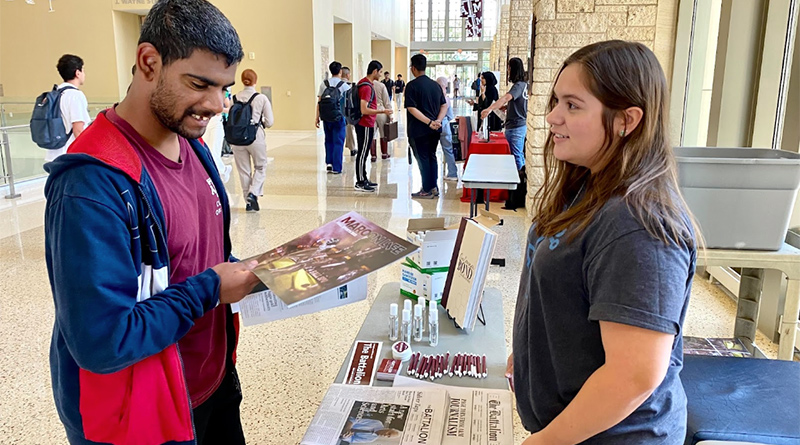Preparing before the collegiate plunge — 15 ways to get prepared to contribute Day 1 on a college media staff

For those high school advisers that have seniors interested in college student media next year, here are 15 things advisers and senior leaders can do in advance to make the successful transition from a high school program to a college media organization.
Tip # 1-Take on a tough story or two!
While it’s always fun to write a profile on your favorite teacher or create a broadcast entertainment video everyone loves and talks about, it’s your job to learn HOW to do a tough news story. Learn some investigative techniques and broaden your portfolio with some hard news here and there. It’s likely some of your BEST work could come from editorial, hard news or investigative pieces (and they could win some national recognition, as well!)
Tip # 2-Learn how to be a great teammate
Are you doing your part when working with partners on a collaborative journalism or media piece? How about clapping for others and supporting them when it’s their turn to shine? It’s essential you learn how to be a supportive and collaborative journalism partner in your student media rooms at the high school level, as a college newsroom is built on the ideals of “team” and group chemistry. What would you rate yourself as a supportive team member? What score would your adviser and classmates give you?
Tip # 3-Handle conflict and issues face to face
In the college newsroom, it’s important to hash out arguments face to face. Unlike the high school block period where our students see each other each day, college student media staffers sometimes go days, if not weeks, without face-to-face interaction. If you’re not communicating at a high level, conflict and issues will arise. Let’s not send messages about each other in a group text about our teammates. Let’s not go behind closed doors to talk about the performance of other staffers. Consider a conversation with someone you have issues with in person, and if you aren’t ready or are unsure of how to have the conversation, ask your adviser to act as a mediator to help the conversation along in a productive manner. This is a CRITICAL skill, and you must learn how to handle confrontation in a professional manner — not just in a college newsroom but the workplace as a whole. Most importantly, take 24-48 hours to game plan HOW to have this conversation, so you aren’t overly aggressive, intimidating or negative to the individual you would like to speak to .
Tip # 4-Prioritize contests and competitions
While it isn’t exactly “normal” to hire an incoming freshman as your next editor-in-chief for an award-winning paper or a business manager position, having a strong resume with lines of awards and achievements definitely helps with the application process. This can show an adviser and the outgoing leadership you have what it takes and are a committed high school journalist, not just one that took the classes for fun and a way to socialize with friends. With a professional resume and a great portfolio of award-winning work at the state and national level, you have a strong chance of snagging an entry-level leadership position the first month you step onto campus!
Tip # 5-Speaking of resumes…Once you begin your senior year, I would consider using Canva or taking a business/media course that helps you put together a professional resume. When considering what to place on your resume in regards to student media experience and efforts, make sure you put your leadership roles, and be as specific as possible about the primary functions within that position. Use strong verbs and really focus on your leadership, management, bringing together a team and how you acted as a “second adviser” to your teacher/adviser within the position. Make sure to include individual and team recognition received at any point during your high school publications career.
Tip # 6-Focus on academics first and foremost
On most college campuses, you can find student journalists majoring in all fields from nursing to architecture, business to engineering. Your major does not dictate how little or how much you can still contribute to student media at the college level. When deciding what college/university to attend after your senior year, make sure you’re picking the right school based on major, academics and career potential upon graduation. The student media experience is just the “icing on top” of your collegiate experience and a large percentage of college journalists are actually majoring in completely different fields or like-minded fields to journalism (public relations, strategic communications, sports administration, etc.) For those that are majoring in fields connected to the daily work you do on your student media staff, this is your chance to create impactful journalism work that makes a difference on your campus and helps you land your dream job!
Tip # 7-Taking advantage of the “extra” opportunities
A great high school media program offers student journalists opportunities throughout the academic year to learn from others, travel and experience new things. Make sure to visit your state’s high school journalism conference or state convention, if you have the chance! Take the time to visit a local newspaper, or even consider shadowing a local fashion or sports photographer in the industry. Whether it’s shadowing, summer internships, extra assignments for your yearbook or even creating your own “side hustle” business on the weekends, the transition to a college student media staff will be easier if you take advantage of the opportunities that come your way. If you consider yourself a “sponge” as a high school journalist that’s willing to soak in new experiences when they are presented, you will be ahead of the curve when joining a student media staff at the college level!
Tip # 8-Learn a little bit about the business side
When I think about my best high school editors, I often go back to the ones that were willing to learn about all parts of the student media operation and how it works. This includes the business side of advertising sales, working with clients, communicating with stakeholders and even working with local media at times. It’s important to know how much printing your newspaper or yearbook costs. It makes sense to understand HOW you could effectively advertise in your broadcast show or how advertising in your podcast COULD improve the equipment you’re using to produce the show. Even at the high school level, generating revenue and finding more effective ways to market your product teaches real industry skills and knowledge. The equipment, travel, contests, pizza nights and everything else a thriving functional media staff does costs money not just during the school year — but even during the summer months (summer camps and workshops!)
Tip # 9-Build your grit/toughness with handling adversity
Have you ever created a controversial piece of journalism work that upset students or your school community? What about numerous attempts at contacting sources about a story you’re working on with a tight deadline? You can expect the same hurdles and speed bumps when joining a college media staff, with a MUCH bigger campus and school community than your high school you graduated from. You must be courageous, relentless and willing to take one on the chin as a college journalist in the world we live in today (one that often devalues media outlets that are ethical and just in their courage!) You must hold those in power accountable for their actions, but can expect to be called out and questioned when covering hard news, athletic teams, university figures and those who hold power and position at your university. Take your time in the reporting process, stand your ground, work with your editors and continue practicing the ethics and values taught to you in your introductory journalism course in high school and hopefully the one you take again in college!
Tip # 10-Become coachable through constructive criticism
Learning how to take constructive criticism in your high school years often takes maturity, time, and understanding as to the fundamental purpose of what constructive criticism really is. I can tell you first hand that only 10-20% of high school students I’ve advised understood not just how to listen to this feedback, but actually apply their learnings to their future work in whatever department they worked on. Your adviser’s job is to provide helpful tips and detailed feedback in a timely manner to you on the work you’re doing to help your development, personal growth and build some of that toughness/grit I mentioned earlier in this article. Getting tough feedback, taking losses and learning the hard way tend to be some of the biggest growth moments we can have as a creator, student journalist and human being as a whole. In a way, learning how to take this kind of advice and feedback helps prepare you for the real hurdles, speed bumps and relationship issues you will face as a collegiate student. Through tough feedback and professional advice from your adviser (or even critique judges!) you can begin to develop an armor, a confidence, that you can take on any story and somehow or another, you will see yourself to the finish line regardless of what comes your way during the creative journey.
Tip # 11-Contribute to the culture in a constructive way
How’s the culture in your newsroom? Is it positive, uplifting and an area where students can take chances and grow as creators? Is it negative, demeaning and staffers are feeling discouraged, not heard and running out of gas at the end of each week? Consider creating an “editor” survey to give to your staff if you hold a leadership position. This can give you excellent feedback and constructive criticism (see Tip #10) on how you can improve content, culture and community in your classroom. Culture cannot be created JUST by the adviser at the top. It’s the troops, the ones on the ground creating content, that must demonstrate culture, community, collaboration and connecting with one another. Building culture takes extra work outside your daily job duties. It means getting together on a Saturday for coffee. It means an extra deadline night where you create a game during the evening so staffers can get to know each other better. It means holding others accountable for their duties and expecting the best from one another. Culture can be the ideals and goals the adviser talks about, but its implementation must be editor and student leader driven.
Tip # 12-Learn the program BEFORE you arrive to campus
Once you have decided your college and know you would at least be somewhat interested in continuing your creations in student media, it’s time to begin researching what your respective college offers in regards to student publications. Even if you aren’t majoring in journalism or communications, you can often make part-time money writing stories, taking photos, creating spreads or even selling advertising for a college media outlet. Most collegiate publication teams have students of various majors that still LOVE to create content, therefore they stick around to be a part of a team, storytell and continue doing what they love when their schedule allows it. Knowing things like how often the newspaper publishes, multimedia opportunities on their news website, and even if the school offers a collegiate yearbook will help you make the jump next fall. You may even be able to contact current editorial leaders on staff for a newsroom/student media space tour, get to know the advisers and take a portion of your college campus visit to the student newsroom to see what it’s really about!
Tip # 13-It’s simply “a lot more” overall
When talking to my assistant news editor about a week ago, I asked him what is the most difficult part of the transition from high school to college. He simply said, “It’s just a lot more really.” It’s more in regards to the people and community that view your story. It’s even more of a hassle tracking down sources on campuses with thousands of people and finding those who want to be interviewed. It’s also more because your whole world sort of “explodes” as a college freshman with part-time job opportunities, student organizations, 12-15 credit hours and still trying to balance friends, relationships, family and learning how to be on your own. The first semester as a freshman can really be a whirlwind experience, but finding a constant like contributing to a student media staff could just be the stability you need to feel some comfortability starting your new collegiate journey.
Tip # 14-Stepping out of your shell
If you are primarily into news, it’s time to take a chance and write a deep feature on someone interesting in your community. If you want that large journalism scholarship for incoming freshmen, you may need to create a broadcast package with real storytelling instead of just a game show piece each time your broadcast show is produced. If you are a graphic designer and layout spreads for your yearbook, how about some illustration, photo manipulations or finding ways to use Illustrator that you have never tried before? Your senior year, especially the spring before you graduate, is a time to step outside of your “bread and butter” niche and add 1-2 new skills to your toolbelt. You will be asked to be versatile, flexible and try new things on a collegiate publication staff. Get used to the idea that we must constantly reinvent the way we produce content from a written and visual perspective. That’s growth and that’s how we evolve as creators and content producers for our high school campus and (future) college community.
Tip # 15-Putting faith, family, and academics before deadlines
It’s all too common for our top student leaders to put deadlines and publications before classes, proper sleep, friends while stretching themselves thin to ensure a quality product is put out. While this is the kind of dedication we as advisers are looking for, we all could use a reality check that our day jobs cannot always take priority over the heaping plate of responsibilities and roles we have. It’s important to unplug and not answer your email and Slack messages during break. It’s healthy to get out of the office and teambuild/spend time with staffers where you aren’t talking about work things. Most importantly, there are simply times during the week where you need to check out and be “present” with your faith, family, friends and those courses you are paying thousands of dollars to attend. College is truly a juggling act, and being a staffer of a college publication can often test your judgment and have you making last-minute decisions that aren’t healthy for your long-term results as a student. We become the BEST version of ourselves in the workplace and as contributors when we make sure we’re filling our cup proportionately and balancing our responsibilities appropriately.




Very inspirational. Culture can be the ideals and goals the adviser talks about, but its implementation must be editor and student leader driven. Keep it up!